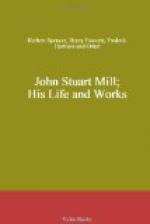JOHN STUART MILL
I. A sketch of his
life.
H. R. Fox Bourne
II. His career in the India
house.
W. T. Thornton
III. His moral character.
Herbert Spencer
IV. His botanical studies.
Henry Trimen
V. His place as A critic.
W. Minto
VI. His work in philosophy.
J. H. Levy
VII. His studies in morals and
jurisprudence.
W. A. Hunter
VIII. His work in political economy.
J.
E. Cairnes
IX. His influence
at the universities.
Henry Fawcett
X. His influence as
A practical politician.
Millicent Garrett Fawcett
XI. His relation to
positivism.
Frederic Harrison
XII. His position as
A philosopher.
W. A. Hunter
I.
A SKETCH OF HIS LIFE
John Stuart Mill was born on the 20th of May, 1806. “I am glad,” wrote George Grote to him in 1865, with reference to a forthcoming article on his “Examination of Sir William Hamilton’s Philosophy,” “to get an opportunity of saying what I think about your ‘System of Logic’ and ‘Essay on Liberty,’ but I am still more glad to get (or perhaps to make) an opportunity of saying something about your father. It has always rankled in my thoughts that so grand and powerful a mind as his left behind it such insufficient traces in the estimation of successors.” That regret was natural. The grand and powerful mind of James Mill left very notable traces, however, in the philosophical literature of his country, and in the training of the son who was to carry on his work, and to be the most influential teacher in a new school of thought and action, by which society is likely to be revolutionized far more than it has been by any other agency since the period of Erasmus and Martin Luther. James Mill was something more than the disciple of Bentham and Ricardo. He was a profound and original philosopher, whose depth and breadth of study were all the more remarkable because his thoughts were developed and his knowledge was acquired mainly by his own exertions. He had been helped out of the humble life into which he had been born by Sir John Stuart, who assisted him to attend the lectures of Dugald Stewart and others at Edinburgh with a view to his becoming a minister in the Church of Scotland. Soon finding that calling distasteful to him, he had, in or near the year 1800, settled in London as a journalist, resolved by ephemeral work to earn enough money to maintain him and his family in humble ways while he spent his best energies in the more serious pursuits to which he was devoted. His talents soon made him friends, and the greatest of these was Jeremy Bentham.




